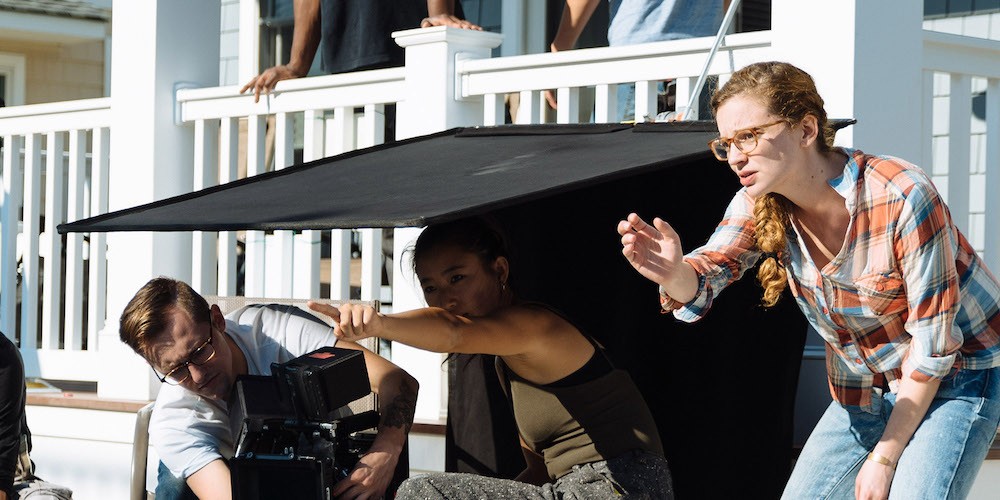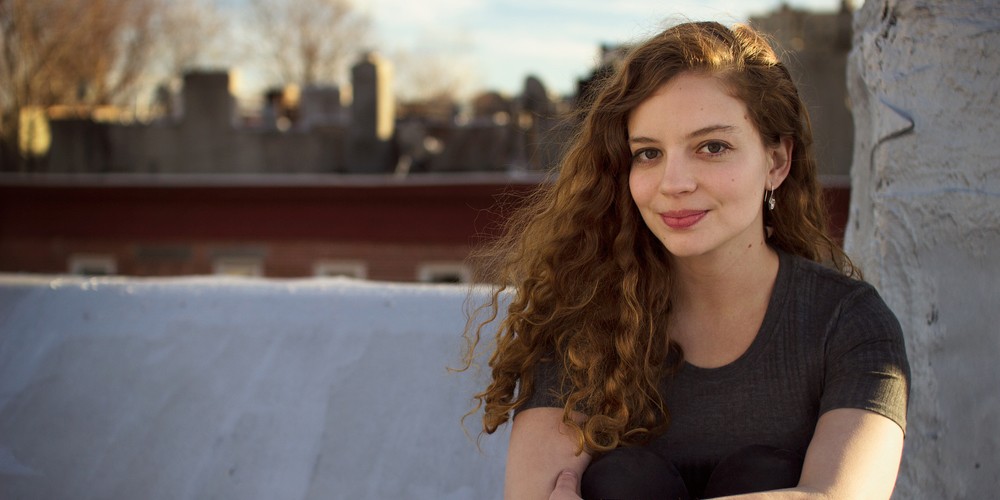Meet the Makers: Chloe Sarbib
Meet the Makers is an ongoing interview series highlighting current Columbia University School of the Arts Film Program students and faculty.
Chloe Sarbib is a screenwriting student currently in pre-production for a narrative short film, scheduled to shoot in July in NYC. Her 2nd year film, Girlfriend will premiere at Provincetown International Film Festival and her film, Go Tell Your Fathers, is playing Palm Springs International ShortFest, both in June.
Where are you from and what's your background in film?
I grew up in Washington, DC, with an American mother and a French-Algerian father. As a kid, I couldn't make up my mind what I wanted to do. My first love was writing. I was deeply uncool, read more books than I had friends, and loved hanging out in worlds of my own making (and sucking my sister into them, too). Music is also a big part of my life. I sing constantly, I played classical piano for 10 years, and I also play a bit of guitar, mandolin, and clarinet. I discovered photography in high school and that confused me even further. How could I do all of these things at the same time? I didn't want to pick. Then I made my first film and realized there was a way to do everything at once. I have been a filmmaker ever since. Before Columbia, I was working as the assistant to a director and making stuff on the side.
Why did you decide to pursue a graduate degree in filmmaking?
In my first job out of college, I was doing a lot of work adjacent to directing. I worked for director Tanya Wexler — she is amazing and was extremely generous with me. I helped her read and develop scripts, prepare pitches, and work with actors and producers. The day came when she gave me the opportunity to pitch on a small-budget feature script that her production company wanted to make. I worked really hard on my pitch, and it went well. But the next day Tanya and I had a great conversation in which she told me that what I needed now was practice. I'd learned how to pitch and structure a movie, but I hadn't spent much time making them. I needed to shoot a lot, so everything I'd learned could coalesce in the service of creating emotionally resonant, original, specific films. And grad school felt like the place for that: an incubator where I could spend all my time creating in the context of a talented community that would support me.
What’s the pleasure of directing?
In the best moments when I'm directing, my mind speeds up and I'm more focused than I can ever be at any other time. The pressure makes me smarter and faster than usual. I love that feeling. It's scary because I'm afraid, every time, that it won't happen. But when I'm in it, it's amazing. It's also so gratifying when your vision meshes perfectly with the work of collaborators who are better at what they do than you are. When you don't get too stuck in what you imagined alone in your room, you can react on set and accept the gems being offered by those around you. I used to be obsessively controlling of my work, wanting to realize exactly what I had envisioned when I wrote the script. But the last few films I've made have been stronger because I've trusted my team.

What has been your biggest challenge at Columbia?
The hardest thing about Columbia has been trying to drink from a fire hose — there's so much to do all the time. I love being so busy I can't think, but at a certain point the burnout starts to hit. When you're writing a feature and a pilot and in pre-production on one short and in post-production on another, as we all are, you start to go a little crazy — and I think each individual project begins to suffer. I've just finished the boot camp that is the first 2 years of this program, and I'm excited to have the space to focus more deeply on each project, rather than spreading my attention across a lot of different ideas.
What are you currently working on?
I'm very lucky to have two films playing festivals this summer. One short, Girlfriend, is premiering at the Provincetown International Film Festival in June, and another, Go Tell Your Fathers, is playing at Palm Springs International ShortFest the following week. I'm trying to get everything together for those — it's my first time going to festivals of this scale so I'm really excited. I'm also in the early stages of planning a small summer shoot as my Directing 4 project, working on revising the 2 features I've written in the program so far, and beginning work on a third feature. I have another short slated to shoot in Annapolis in the fall. And, of course, I'm beginning to conceptualize my Columbia thesis film, which I hope to shoot in France.
What kind of a filmmaker do you hope to be in future / was stories will you tell?
I always have trouble with this question because I like so many different kinds of stories! To be honest, I struggled a lot, especially when I was younger, with anxiety and depression, and often the only thing that could help — that could take me on a little vacation from my life — was stories. Whether books, movies, or music, the art I interacted with when I was having a hard time made a huge impact. It made me feel something, and I hope all of my films achieve that. I hope my films transport their audiences somewhere they wouldn't otherwise get to go.
Now, especially, there's so much visual content out there. So, when I think of an idea, I ask myself: is this new? Has this specific experience been onscreen before? How can it subvert the collective memory bank of images? In this age of image saturation, how can I use my audience’s visual literacy to enrich my story – to buy me more story than I’m even writing? Can this film put someone in the shoes of a character they would never otherwise understand? How can I sneak up around someone’s existing ideas and hit them at their emotional core? I'm constantly trying new things, and tend to work story-by-story. I write both straight comedy and straight drama. In the past year, I've written, or come up with, ideas that are grounded and realistic, period pieces, and science fiction/fantasy. But the thing that tends to tie it all together is strange, boundary-crossing female relationships, and the murkiness that can lurk within that kind of closeness.
